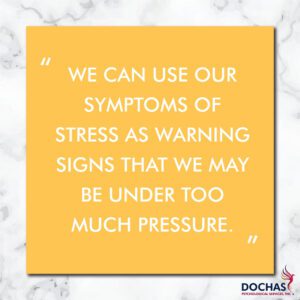Welcome back to the blog! It’s Rachael here, and today I’m going to talk about something I’ve definitely been experiencing these past few weeks—stress symptoms. After this past year and a half, we all feel pretty experienced when it comes to stress—we’ve had to deal with a lot of change, not to mention all the usual life stresses with our relationships, our workload and our emotions. But today is a good day to take a moment to examine our symptoms. A little bit of stress is beneficial, and none of us can avoid stress completely. So when are stress symptoms too much?
Stress is everywhere and affects us all. While a little stress can be motivating, too much stress can wear us down physically and mentally. When we perceive a situation to be harmful, our bodies kick into a fight-or-flight response to help us manage the situation. However, if we become too used to experiencing this stress response, it becomes difficult to recognize when we are stressed until we reach our breaking point.

Our breaking points are personal! The amount of stress a person can handle, and the symptoms experienced when stressed, vary from person to person. By taking the time to learn about the different symptoms of stress and reflecting on our personal experiences and whether we feel these symptoms, we can develop our awareness of our own stress. We can act on it before reaching our breaking point.
Stress symptoms can be broken down into four categories: Cognitive, Emotional, Physical, or Behavioural.
Cognitive Stress Symptoms
These symptoms alter our ability to think. We might experience memory problems, difficulty concentrating or increased worry.
Emotional Stress Symptoms
In contrast, emotional symptoms alter our feelings—for example, increased moodiness, feeling overwhelmed, or decreased happiness.
Physical Stress Symptoms
These are the symptoms we feel in our bodies, such as aches and pains, nausea, increased illness, rapid heart rate.
Our blog has a great post about how to identify and deal with physical stress symptoms here.
Behavioural Stress Symptoms
Stress can lead to changes in our behaviours, such as changes in eating or sleeping habits, an increase in nervous habits, or procrastination.
Evaluating our stress:
Once we recognize these symptoms of stress in ourselves, we can use them as warning signs that we may be under too much pressure.
One useful technique to do this is to develop a stress symptoms scale, which includes the symptoms you personally experience while under different amounts of stress (check out the example that I created for myself below). You can then use this scale to help you assess whether you are experiencing too much stress and need to intervene and reduce your stress levels.

Did you just discover you need to manage the stress you’re experiencing right now? Here’s one resource I found helpful: 6 Natural Ways to Manage Stress. You can also try this mindfulness-based stress reduction strategy on our blog. And if you need a little more help, get in touch with us at Dóchas Psychological Services for support. We have a team of psychologists who’d love to help you find ways to manage your stress or anxiety.

About Dóchas Psychological
Dóchas Psychological Services is a well-established and trusted therapy clinic located in Spruce Grove, Alberta. At Dóchas we value the idea that everyone deserves a safe space. Through connection and education, our team works hard to build a trustworthy relationship with each of our clients. It is our goal to create a community for our clients to feel like they belong.
Disclaimer
Information provided through Dóchas Psychological Services blogs or vlogs is meant for educational purposes only. They are NOT medical or mental health advice. You can read more about our disclaimer here.









